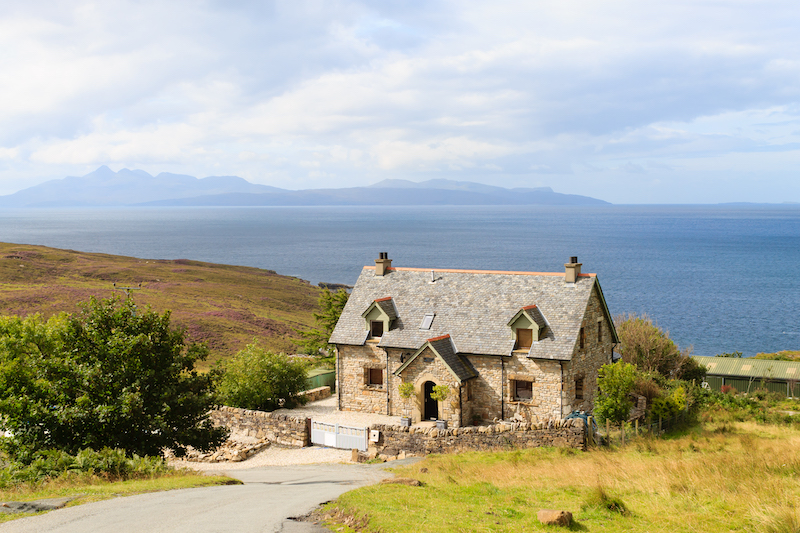Although almost everyone in Wales is fluent in English, the Welsh language has a steadfast place in the country’s culture and history. In fact, according to a recent survey, approximately 30% of the population of Wales can speak Welsh, thanks in part to the increase in Welsh-medium education.
I can tell you first-hand that whenever I try to speak in Welsh, I am met with nothing but encouragement and sincere gratitude. They really do appreciate the effort.
This is why it’s feel it is essential for everyone to learn a few basic Welsh words and phrases before visiting Wales.
This article won’t make you fluent – you’ll need years of experience speaking the language for that – but it will teach you many of the phrases you need to know to start conversing in “the language of heaven”.
Note 1: All phrases mentioned in this article are in the northern dialect since this is the variation with which I am most familiar. At the end of each section, I also reference the southern alternative. Usually the two are almost identical barring some slight variation in spelling and pronunciation!
1. Su’mae!
English translation: Hello!
Su’mae is the very first greeting many Welsh beginners learn. An abbreviation of sut (how) + mae (is), it literally translates as How are (things)?
Most speakers pronounce it as s’mae and it can be written this way as well.
Note that it isn’t at all uncommon to hear the familiar greetings Helo! and Hiya! instead of Su’mae.
Southern Welsh: Shwmae! (pronounced shoo-mai)
2. Sut dach chi?
English translation: How are you?
Once you’ve learned S’mae, you can follow up with the phrase Sut dach chi? which means How are you?
Whereas Sut dach chi? is reserved for people to whom you wish to show respect (your elders, shopkeepers, people you don’t know well, etc.), the informal Sut wyt ti? can be used with friends, family, children and people of the same age.
Find out more about this and other related phrases in our dedicated article.
Southern Welsh: Sut dych chi? (formal) or Sut wyt ti? (informal)
3. Da iawn!
English translation: Very good! / Well done!
Da means good and iawn means very (in this specific context) so by putting the two together, you are literally saying Very good! You can use it to congratulate someone or show approval.
- Dw i wedi gorffen y gwaith! – Da iawn! = I’ve finished the work! – Well done!
Iawn! on its own can be translated as Okay! / Fine! / Great!
- Sut wyt ti? – Iawn! = How are you? – Fine!
- Dw i’n mynd allan. – Iawn. = I’m going out. – Ok.

4. Diolch yn fawr iawn!
English translation: Thank you very much!
The word for thank you in Welsh is diolch. Followed by yn fawr iawn (very big) you get the expression Diolch yn fawr iawn! which translates literally as A big thanks!
- Dyma anrheg i chi. – Diolch yn fawr iawn! = Here is a present for you. – Thank you very much!
Find out more about this phrase in our dedicated article.
5. Croeso!
English translation: You’re welcome!
Croeso! means both You’re welcome! (the response to thank you) and simply Welcome! (the polite and friendly greeting).
- Diolch am ddod heddiw. – Croeso! = Thanks for coming today. = You’re welcome!
- Croeso, dewch i mewn! = Welcome, come on in!
6. Os gwelwch yn dda.
English translation: Please.
This very long expression means please in Welsh. Os means if, gwelwch means you will see, and yn dda means well, so it literally translates as if you see well. The informal version is os gweli di’n dda.
- Siaradwch yn arafach os gwelwch yn dda. = Speak more slowly please.
If you find it hard to say at first, you can always use plis instead.
7. Mae’n ddrwg gen i.
English translation: I’m sorry.
Mae’n ddrwg gen i literally translates as it is bad with me.
- Mae’n ddrwg gen i am yr ymateb hwyr. = I’m sorry about the late response.
As in the case of please, you will hear people using the word sori as well, so don’t stress too much if you struggle to commit this phrase to memory right away.
Southern Welsh: Mae’n ddrwg gyda fi. / Mae’n ddrwg ‘da fi. / Mae’n flin ‘da fi.

8. Beth ydy eich enw chi?
English translation: What is your name?
If you are meeting someone for the first time, it is important to be able to ask what their name is. This phrase breaks down as follows: beth (what), ydy (is), enw (name), and eich … chi (your, formal).
The response to this question is very straightforward: simply say your name followed by dw i (I am).
- Beth ydy eich enw chi? – Gareth dw i. = What’s your name? = I’m Gareth.
The informal version would be Beth ydy dy enw di?
Southern Welsh: Beth yw eich enw chi? (formal) or Beth yw dy enw di? (informal)
9. Faint o’r gloch ydy hi?
English translation: What time is it?
To ask the time in Welsh, you’d use the phrase Faint o’r gloch ydy hi? with faint meaning how much and cloch (which mutates to gloch) meaning clock. You are literally asking How much of the clock is it?
The response to this question is Mae hi’n ___ o’r gloch. (It is ___ o’clock.)
- Faint o’r gloch ydy hi? – Mae hi’n 3 o’r gloch. = What time is it? – It’s 3 o’clock.
Southern Welsh: Faint o’r gloch yw hi?
10. Lle dach chi’n byw?
English translation: Where do you live?
One of the first phrases you’ll learn in any Welsh class is Lle dach chi’n byw? or if you’re speaking informally, Lle wyt ti’n byw?
The response to this question is Dw i’n byw ____. (I live ____.)
- Lle dach chi’n byw? – Dw i’n byw yng Nghaerdydd. = Where do you live? – I live in Cardiff.
Another way of saying lle is ble. This is actually the official form that is recommended in many textbooks. However it isn’t used as much in colloquial speech.
Southern Welsh: Ble / Lle dych chi’n byw? (formal) or Ble / Lle wyt ti’n byw? (informal)

11. Sut mae’r tywydd?
English translation: How’s the weather?
The weather (tywydd) is another very important topic in Wales and the rest of the UK as it’s constantly changing!
To respond to this question, simply say Mae hi’n… followed by the state of the weather (heulog = sunny, cymylog = cloudy, etc.)
- Sut mae’r tywydd heddiw? – Mae hi’n bwrw glaw. = How’s the weather today? – It’s raining.
Discover even more weather-related expressions in our dedicated article.
12. Lle mae’r tŷ bach?
English translation: Where is the toilet?
Here’s an extremely important question if you find yourself in sudden need of the facilities! Translating literally as little house, the term tŷ bach was inspired by the small outside toilets that were commonplace at the bottom of the garden before indoor loos became the norm.
- Lle mae’r tŷ bach? – Lawr y coridor ac i’r chwith. = Where is the toilet? – Down the corridor and to the left.
Southern Welsh: Ble / Lle mae’r tŷ bach?
13. Dw i’n dysgu Cymraeg.
English translation: I’m learning Welsh.
This phrase is essential if you want to inform people that you are studying Welsh. If you’re feeling brave, you can follow up with time expressions such as:
- Dw i’n dysgu Cymraeg ers mis Medi. = I’ve been studying Welsh since September. (Literally: I am learning Welsh since September.)
- Dw i’n dysgu Cymraeg ers pum mlynedd. = I’ve been learning Welsh for five years. (Literally: I am learning Welsh since five years.)

14. Dach chi’n meindio siarad Cymraeg efo fi?
English translation: Do you mind speaking Welsh with me?
If you find that people tend to switch over to English because they see you are struggling, you can try asking them if they mind speaking to you in Welsh. There are various ways of saying to mind in Welsh but for beginners, it is easiest to use the English-sounding verb meindio.
- Dach chi’n meindio siarad Cymraeg efo fi? – Dim problem. = Do you mind speaking Welsh with me? – No problem.
The informal version would be Wyt ti’n meindio siarad Cymraeg efo fi?
Southern Welsh: Dych chi’n meindio siarad Cymraeg gyda fi? (formal) or Wyt ti’n meindio siarad Cymraeg gyda fi? (informal)
15. Fedrech chi ddeud hynny eto?
English translation: Could you say that again?
Whenever you fail to catch what someone says in Welsh, ask them to repeat the question instead of switching into English. There’s a high chance you’ll understand more the second time around!
- Fedrech chi ddeud hynny eto? – Wrth gwrs! = Could you say that again? – Of course!
The informal version would be Fedret ti ddeud hynny eto?
Southern Welsh: Allech chi ddweud hynny ‘to? (formal) or Allet ti ddweud hynny ‘to? (informal)
16. Fedrech chi siarad yn arafach?
English translation: Could you speak more slowly?
If you still don’t understand, a good tactic is to ask the other person to speak more slowly.
- Fedrech chi siarad yn arafach? – Wnai drio! = Could you speak more slowly? – I’ll try!
The informal version would be Fedret ti siarad yn arafach?
Southern Welsh: Allech chi siarad yn arafach? (formal) or Allet ti siarad yn arafach? (informal)
17. Dw i ddim yn dallt.
English translation: I don’t understand.
And if you really don’t understand what someone is saying, even after asking them to repeat and speak more slowly, there is no shame in admitting defeat!
- Dw i ddim yn dallt… – Wna i esponio yn Saesneg. = I don’t understand… – I’ll explain in English.
Southern Welsh: Sa i’n deall. / Dw i ddim yn deall.

18. Llongyfarchiadau!
English translation: Congratulations!
The word used to congratulate someone on their success, be it an engagement, marriage or graduation, is llongyfarchiadau.
- Dw i wedi dyweddïo! – Llongyfarchiadau! = I got engaged! – Congratulations!
19. Wela i chi wedyn!
English translation: See you later!
When seeing someone off, a phrase that is commonly used is Wela i chi wedyn! The informal version would be Wela i di wedyn!
Wedyn translates as then / next / afterwards but in this context, it means later.
- Dw i’n mynd rwan. Wela i chi wedyn! = I’m going now. See you later!
20. Hwyl!
English translation: Bye! Goodbye!
Our final phrase is the short and sweet Hwyl! Although it literally translates as fun or sail (of a ship), it also the most common way of saying goodbye or bye in Welsh.
- Wela i di yfory. – Iawn, hwyl! = See you tomorrow! – Ok, bye!
It can be followed by words such as rwan (now), nawr (now), am y tro (for now), and fawr (big) to name a few.
Learn some additional ways of saying goodbye in Welsh in our dedicated article!

Can you think of any other essential Welsh survival phrases? If so, leave us a comment below! 🙂

